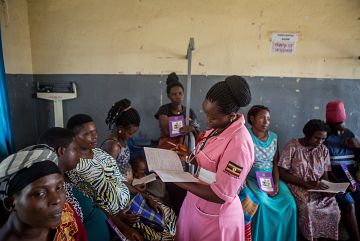New project to boost malaria burden reduction gains in Uganda
26 January 2022
To build on and boost gains made in Uganda’s mission to eradicate malaria, Malaria Consortium is implementing a new project – Supporting Uganda’s Malaria Reduction and Elimination Strategy (SUMRES) – over two years. The project will directly benefit close to three million people across 11 districts, including pregnant women and children under five years’ old.
Malaria Consortium has supported malaria programmes in Uganda for almost 20 years. Through SUMRES, Malaria Consortium will draw on its expertise in malaria burden reduction and quality data use to boost partnerships, multisectoral collaboration and capacity building and improve reporting and public health messaging related to malaria. At the national level, Malaria Consortium will work alongside the Ugandan Ministry of Health’s National Malaria Control Division (NMCD) and Child Health Division (CHD) who will help play a pivotal role in ensuring that key malaria prevention messages are distributed to prevent, control, and manage the disease.
Commenting on the SUMRES project, Project Lead, Francis Abwaimo, said:
“The Supporting Uganda’s Malaria Reduction and Elimination Strategy (SUMRES) project focuses on sustaining previous gains in malaria prevention and control through building capacity at the district, health facility, and community levels and ensuring that health service providers at public, private and community levels collect and consistently use quality data to target interventions to the most vulnerable populations and areas. Building on existing structures and mechanisms to deliver the interventions helps to ensure their sustainability in the long term.”
By 2023, Malaria Consortium aims to achieve at least 90 percent of the population in the 11 targeted districts sustaining the acquired knowledge to prevent, control and manage malaria. It is anticipated that the project will additionally reach and maintain 90 percent of malaria cases being appropriately managed in public, private and community levels as per national treatment guidelines.
The two-year project is funded by The Global Fund to Fight Aids, Tuberculosis and Malaria through The AIDS Support Organisation (TASO) Uganda.
Read the project brief to find out more
Related content
17 August 2021
Celebrating success: huge wins in reducing malaria cases and deaths in Uganda as USAID-funded project comes to a close
19 February 2021Malaria Consortium findings highlight the need to better understand and support community health worker response to COVID-19
Latest news
- International summit calls for AMR accountability in public health interventions21st March 2024
- Global SMC community celebrates new milestone at SMC Alliance Annual Meeting in Nigeria6th March 2024
- Scaling up key interventions could halve pneumonia-related childhood mortality13th February 2024
- Malaria Consortium and eGov Foundation join Mozambique’s national malaria programme to digitalise seasonal malaria chemoprevention campaigns8th February 2024
- World’s first malaria vaccine rollout launched in Cameroon22nd January 2024
- Digital solutions driving equitable access to health6th December 2023